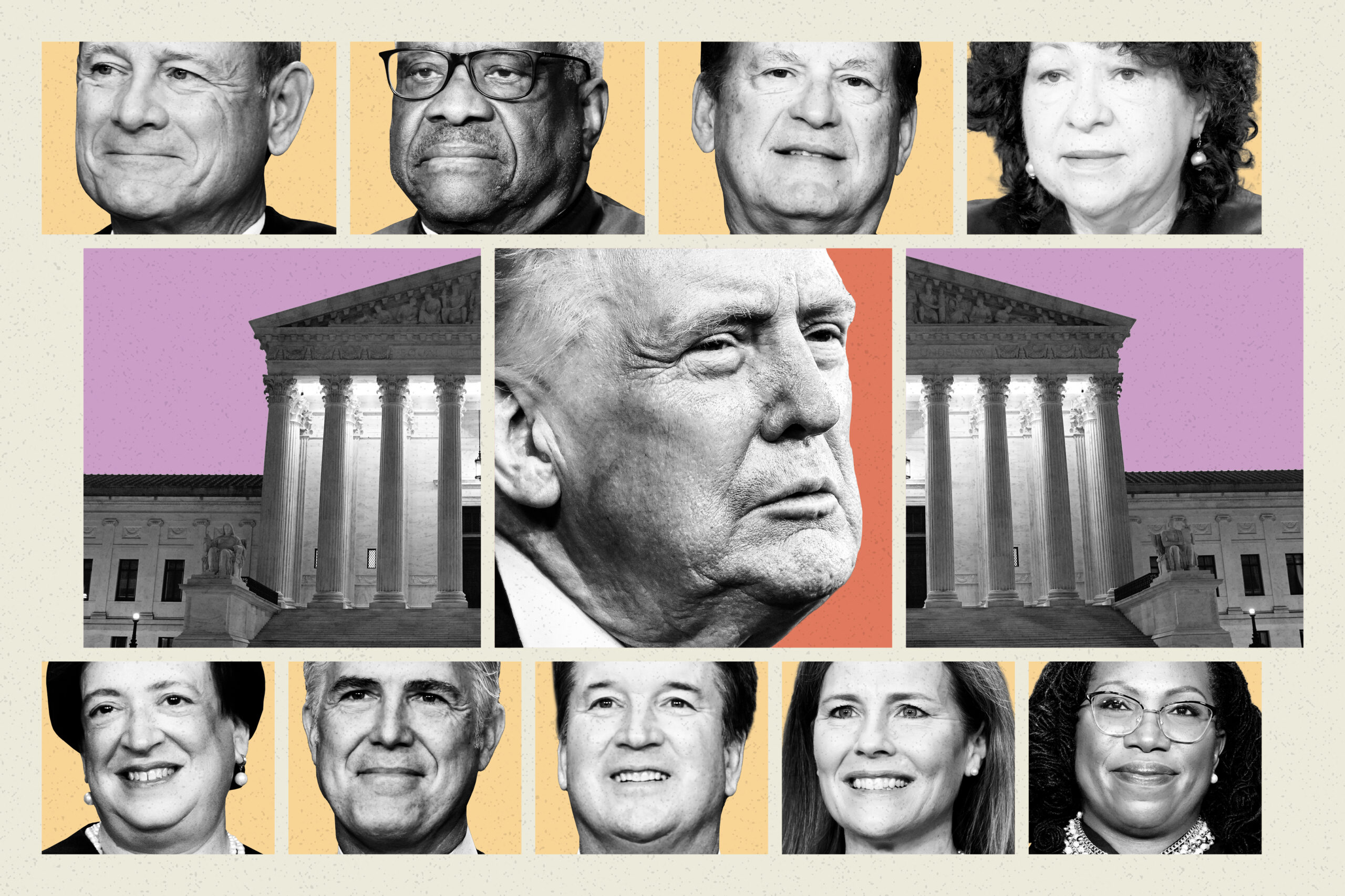CALABASAS, Calif. — Xavier Mitchell’s hilltop mansion is, in almost every respect, a portrait of luxury.
The palatial three-story home sits atop a long driveway in a gated community 22 miles northwest of downtown Los Angeles. Glass doors in the kitchen and living room open to a high balcony with views of the San Fernando Valley. Downstairs, an enormous home theater covered in red-velvet carpeting is adorned with movie posters bearing Mitchell’s name. His neighbor, he says, is David Hasselhoff. Just around the corner, he says, live the Kardashians.
It is from this opulent estate that Mitchell, a 53-year-old Southern California native who calls himself “Sir Dr. Xavier X. Mitchell, PhD.” — more on that later — says he intends to run a campaign that could lead to his home state’s secession from the United States.
Mitchell is the new CEO of Calexit, a California-based secessionist group that — as much as you can say of any fringe organization — is facing a genuine window of opportunity. This largely Democratic state has never been more at odds with the federal government in Washington. In June, Trump sent the country’s military into the state’s largest city to quell a local protest. Homeland Security Secretary Kristi Noem has promised her agency will “liberate” Los Angeles “from the socialists and the burdensome leadership.” Gov. Gavin Newsom and his attorney general Rob Bonta have filed a series of lawsuits challenging the Trump administration’s actions in an effort to punch back. Meanwhile, the state’s voters, well aware that they live in the largest economy in the country, and one of the largest in the world, are unhappily trapped in opposition to the electoral majority of the United States.
Calexit, which has been active since about 2014, tapped Mitchell as its new CEO in February. At the time, the group’s leaders touted him as a business tycoon and fundraising mogul, a man perfectly poised to tap into the state’s growing angst and finally realize their long-stalled dream. Earlier this month, after failing to gather enough signatures to place the secession measure on the 2026 ballot, the Calexit team vowed to target the 2028 general election instead, with Mitchell leading the charge.
But Mitchell, interestingly, says he is uninterested in the politics of secession. Rather, he says, he is a businessman who knows a good opportunity when he sees one. Mitchell, as he tells it, owns companies ranging from basketball teams to mining prospects in distant lands. He says he partners with celebrities for TV shows and movies — even working once with Kobe Bryant’s father, Jellybean Bryant, on a documentary project.
“I know this is politics, but I’m not looking at it as politics,” Mitchell told me over the phone in March. “For me, it’s just a business transaction.”
Pulling up the driveway to his house in the celebrity enclave of Calabasas, the lonely mansion on the hilltop is certainly befitting of a magnate, a sprawling and grandiose vision of new-money California.
But there’s also something amiss.
The lock on the front door hangs limp and broken. Downstairs, drywall from the water-damaged ceiling falls in clumps onto the carpet. Several glass doors leading out to the balcony are missing, replaced by plywood boards and covered up by stock art pictures of oak-lined boulevards and French cafes. In the living room, the sun streams through two-inch gaps in the plywood.
Nothing in Mitchell’s house is quite as it seems. Instead, it is a superficial facsimile of wealth, a flawed stand-in — good enough, maybe, until you take a closer look.
The same could be said of Mitchell himself.
In late February, Marcus Evans, the original founder of Calexit and a longtime advocate of California independence, announced to the world that his improbable campaign had received a major boost.
About a month earlier, Evans had filed a ballot initiative with the secretary of state that would ask voters if California should move toward becoming its own country. It was the third election cycle he had pursued the issue, having failed to gather enough signatures (about 550,000) to place the measure on the ballot in 2018 and 2020.
But this time, Evans announced, things were different. Calexit, the campaign behind the secession initiative, had a new CEO: a multi-millionaire “whale,” he said, who led five publicly traded companies and had partnered with Jennifer Lawrence and Paula Abdul on film and TV projects. The man — Mitchell — had agreed to lead the business side of the initiative and use his deep entertainment industry contacts to fundraise for what was expected to be an expensive campaign costing upwards of $10 million. The development was reportedby the media.
Initiatives rarely have “CEOs,” but rather campaign managers. Nevertheless, Evans believed Mitchell was the perfect person to capitalize on the smash-and-grab early months of the new Trump administration. The state’s policies and values were out of line with the federal government. California was despised by the people atop the executive and legislative branches along with much of the country. Maybe, now it was time to just start over.
For years, the concept of a California nation had appeared to be little more than a fantasy. Beyond being a likely constitutional impossibility (see the Supreme Court’s 1868 ruling in Texas v. White, which disallows unilateral secession), the California independence movement had primarily been driven by an underfunded political fringe that never had the means to force the issue into the mainstream.
Inside the movement, Calexit’s dysfunction was well known. Louis Marinelli, a co-leader during the earlier campaigns, said the group had always operated with a “fake it until you make it” mentality, presenting itself as larger and better funded than it actually was. Marinelli eventually distanced himself from the group after clashing with the more left-leaning Evans over issues of race and policing during the Black Lives Matter protests. (Marinelli has also drawn scrutiny for his ties to Russia.) Across all its iterations, Calexit had never landed a major donor, Evans said.
But a second Trump presidency, which reordered California’s place in the national hierarchy, appeared to give the issue new life. In January, a YouGov poll commissioned by the San Diego-based Independent California Institute, a think tank focusing on self-governance issues, showed that 61 percent of Californians believed the state would “be better off if it peacefully seceded.” A YouGov nationwide poll asking voters about state independence earlier this year showed interest from Californians behind only Alaskans and Texans, and with no partisan split. Meanwhile, the California National Party, a progressive and libertarian-coded group intent on secession, has increasingly been fielding candidates in races for local offices as it works to build party membership from the ground up. (The California National Party has not publicly supported the ballot measure, and has disavowed Calexit in the past.)
If Calexit’s next signature gathering effort is successful, it would mark the first time a secession measure has made it on the ballot in the state. The initiative would ask voters if California should become its own country and create a commission to study the viability of such a move, setting the stage for a later referendum that would formally begin the process of secession. Although the chance of California actually leaving the union anytime soon is essentially zero (and would likely result in violence — the most notable example of a U.S. separatist movement being the Civil War), Evans and the Calexit campaign seem to believe they can at least force a national conversation. Already, political figures like U.S. Rep. Marjorie Taylor Greene (R-Ga.) have proposed a “national divorce” between red and blue states.
Evans, who’d faced failure with his quixotic mission before, was convinced that this time, Californians would be receptive to his vision. And last February, just as he was mulling over how to gather the financial backing to achieve his vision, like manna from heaven, a message from Mitchell arrived in Calexit’s inbox, offering his aid to the campaign. It amounted to an incredible coup for the California secession movement, and for Evans himself, an unheralded political figure who saw the email as a sign that he finally proved he could attract big money.
Although there was some initial skepticism about a millionaire donor appearing out of thin air, those concerns were quickly dispelled, Evans said.
“We would be foolish if we did no vetting,” Jason Wright, another leader of the Calexit campaign, told me. “It was like, ‘Hey, I’ve never heard this guy’s name before, so let’s Google him up.’”
Even though he had no experience with ballot initiatives — or politics, for that matter — Mitchell’s credentials seemed unimpeachable. He had a public online profile and professional company websites. His IMDB profile was filled with executive producer credits. There were press releases from his companies touting his doctorate and celebrity partnerships. In 2023, he posted on X that he had received a lifetime achievement award from President Joe Biden.
After a brief email exchange, Mitchell invited Evans and Wright, who live in Fresno and Northern California respectively, to Calabasas to talk shop. The three sat for hours in his grand mansion, discussing what a partnership might look like.
His first course of action would be to incorporate the campaign and bring in cash for Calexit. He said he told Evans and Wright he could raise as much $25 million to hire professionals and run a campaign. To raise the funds, he would launch a Calexit cryptocurrency backed by the cobalt and lithium mines he claimed to own in the Democratic Republic of the Congo.
It’s the type of outlandish plan that should have raised red flags. But Evans and Wright were convinced, they told POLITICO Magazine. With Mitchell as the CEO, California could rise as its own nation. Soon after that meeting, Calexit put out a press release touting Mitchell’s experience as a “military veteran, entrepreneur and philanthropist.”
“From his service during Desert Storm to the boardrooms of multinational corporations, the mines of Africa … and the innovation of digital banking, Xavier Mitchell’s career exemplifies resilience, vision, and transformative impact,” the Feb. 18 release read.
At the time, Mitchell positioned himself as a savvy businessman who knew a good product when he saw it. But Mitchell expressed little interest in the political ramifications of the movement or the constitutionality of the mechanism that its boosters had chosen.
By the time I met Mitchell, Evans and Wright in person at Mitchell’s mansion in Calabasas in May, they were claiming success.
As they sat in suits on a white couch in the living room, fidgeting with their collars, the men told me things had gone even better than expected. Mitchell claimed the campaign had managed to gather 200,000 signatures — about a third of the amount they needed by late July to qualify for the 2026 ballot. The campaign had just hosted a fundraiser at Mitchell’s home over the weekend, which they said was filled with “community leaders,” though they didn’t specify who. They’d just launched their Cali-Nation cryptocurrency, and Calexit had incorporated as an LLC, as Mitchell promised. The three men enthusiastically talked about their ambitious plans to barnstorm the entire state, visiting dozens of cities and building support.
In Calexit’s previous campaigns, Evans never got an opportunity to talk to millionaires, or to host big-ticket fundraising events. The campaigns failed to gather even a quarter of the number of signatures required to reach the ballot. After two failed efforts, few believed in his idea, nor did they feel it was worth their time or money.
Finally, with Mitchell, he had found someone who did.
“A month and a half ago, he said, ‘Trust me, I know how to put this together,’” Evans said of Mitchell in May. “It’s put together now. Everything he said he wanted to do, we’re doing.”
But if Mitchell’s previous business transactions are any indication, Calexit could be headed for a disastrous collision with a man that appears to have a very, very different backstory than what he claims.
One of the defining features of California politics is the annual arrival of ballot measures that make impossible promises. Each year, dozens of eccentric initiatives pop up at the local and state level, frequently with unrealistic and overstated promises. In this sense, Sir Dr. Xavier Mitchell, PhD, seems tailor-made for this world — only, he’s not over-selling his ballot initiative; he’s over-selling himself.
On social media, Mitchell is both boastful and defensive, lashing out at unnamed critics and doubters while touting his own achievements.In one post, where he’s seen standing with a group in front of a studio warehouse in Los Angeles, he writes that he has the “keys to Hollywood.” In another,under a video collage punctuated by the hashtag #WatchMeRise, he writes, “they turned their backs, ignored me, and doubted me … now they gotta watch me win from the sidelines.”
That rise does not seem imminent. The March quarterly report for Mitchell’s primary company, Valiant Eagle, which purports to be “focused on the energizing of entertainment in television, the Internet, and social media,” showed the business with only about $2,000 cash on hand, with its stock trading at one ten thousandth of a cent. A separate production company of Mitchell’s, Providence Films, has fewer than 250 followers on X, and six subscribers on YouTube. It has 3,623 followers on Instagram, but only one post. The TV show on which he claimed to be partnering with Paula Abdul, of American Idol fame, was removed from YouTube for violating community guidelines. (Abdul could not be reached for comment.)
None of his companies appear on major exchanges, but rather on so-called OTC (over-the-counter) markets that have less stringent reporting requirements and allow securities (often penny stocks) to be traded directly between two parties. Although Mitchell does seem to have created a number of LLC’s, at least one of them is currently suspended by the Franchise Tax Board, and the miniscule stock prices of others hardly denote grand wealth.
Mitchell’s titles too, appear dubious at best: His knighthood was granted to him by Al-Numan Gharios El Chemor, a man living in Beverly Hills who claims to be the sovereign prince of a 6th century Arab dynasty. His doctorate was earned from a theological institute unaccredited with the Department of Education. And at least some of the celebrity endorsements of his company, including one from the famed 80s TV cop Erik Estrada, appear to be purchased from Cameo (watermark included), a website where celebrities sell personalized videos. Mitchell sent me a photo of his presidential lifetime achievement award, which appears to be an award presented by AmeriCorps to those who complete 4000 hours of community service. We weren’t able to verify its authenticity: It is not listed on any official awards page, and the link to the press release he posted on X is now broken. AmeriCorps, which issues the awards, did not respond to requests for comment. El Chemor, the purported prince, also did not respond to requests for comment.
It’s unclear, even, what exactly Mitchell’s current claim is to the mansion in Calabasas. The most recent deed filed with the Los Angeles County Recorder’s office shows that the home was purchased for $4 million by the financial services arm of a Delaware bank in 2024. The previous owner, one of Mitchell’s companies called Immediate Properties, defaulted on the house in 2022 and filed for bankruptcy a year later. Mitchell, the company’s CEO, signed those bankruptcy papers himself. (WSFS bank, which owns the property, said they could not confirm or deny any agreement with Mitchell that would allow him to occupy the property.)
Mitchell himself filed for personal bankruptcy protection that same year, in 2023, according to legal records. In those filings, he listed 16 debtors, each of whom he owed thousands of dollars or more, including a $2.9 million debt to the IRS and $50,000 in credit card purchases.
Those facts do not paint the picture of a successful entertainment mogul. But beyond his financial woes and fabrications, Mitchell appears also to be an extremely prolific fraudster, with a civil and criminal record of financial swindling and deceit.
In 2019, he was accused in a civil case before the Superior Court of San Francisco of stealing the identity of a man named Salvatore P. Lucia and applying for two separate business loans worth a total of $1.4 million, court records show.
According to the complaint, Mitchell, who is described as “a convicted felon residing in Tarzana, California,” applied for a $700,000 loan from a company identified only as “United States Real Estate Corporation” in February 2019. Mitchell allegedly provided a fake California driver’s license bearing Lucia’s name, along with Lucia’s Social Security number, and said that he needed the money to cash out the equity on a property he claimed to own in San Francisco for “business purposes.”
After the loan was approved, $583,699.91 was deposited into a Wells Fargo account that Mitchell allegedly controlled under a company called Golden Properties, according to court records I obtained. Soon after, however, Wells Fargo raised red flags about the account. Landmark Escrow, the company contracted to facilitate the loan, tried to contact Mitchell, who allegedly did not respond. Believing the loan was fraudulent, Landmark Escrow then filed an internet crime complaint with the FBI, according to court records.
That same month, Mitchell apparently applied for another loan from a different company, Galloway Financial LLC. Allegedly using the same tactics, Mitchell was approved for a separate $700,000 loan, $601,000 of which was deposited into a One West Bank account allegedly controlled by Mitchell, according to court records. Two weeks later, Galloway Financial too learned that the loan was possibly fraudulent.
Just a few months later, in September 2019, prosecutors in the San Diego County District Attorney’s office charged Mitchell with 54 counts of alleged felonies committed between 2017 to 2019, ranging from identity theft and forgery of documents and items to mortgage fraud and attempted grand theft of personal property. The alleged fraud involving Galloway Financial and Lucia was named in two of the counts.
The criminal complaint described Mitchell as occupying “a position of leadership” in the criminal schemes and that he had “prior convictions as an adult” of “numerous and of increasing seriousness,” along with a juvenile record.
In March 2023, Mitchell pled guilty to one count of identity theft, one count of filing with a false document, one count of perjury, and an aggravated white collar crime enhancement for committing two or more fraud-related felonies resulting in an over $500,000 loss. (These charges were unrelated to the Galloway and Lucia civil suit.) A month later, on April 23, 2023, he was sentenced to a year in county jail, a 10-year stayed prison term and 10 years of probation. He was released on parole Sept. 20, 2024. (The civil proceedings were ultimately dismissed after Mitchell signed a settlement to return the frozen loan funds to the plaintiffs.)
But his legal troubles were not behind him. In 2021, prosecutors in the Los Angeles County District Attorney’s office had also charged Mitchell with 27 felonies ranging from forgery to attempted grand theft. According to a spokesperson with the office, Mitchell had allegedly illegally acquired the title to vacant lots in Beverly Hills, Malibu and Tarzana over an eight-month period in 2018 through forgery and identity theft, then tried to sell those properties to “unsuspecting buyers” or to obtain loans. Total losses were estimated at $643,000.
Last fall, on Nov. 7, 2024 he pleaded no contest to five of those felonies (two counts of grand theft, one count of identity theft and two counts of forgery) in Los Angeles County. The rest of the charges were dismissed after a plea negotiation. Mitchell was ordered to pay $643,000 in restitution to three victims and sentenced to five years probation. The judge in the case called the punishment “a long time coming.”
Three months after that sentencing, less than six months out of jail for fraud, and only about a year after filing bankruptcy, he emailed Evans, Wright and the Calexit ballot measure group, offering to guide their campaign.
According to court documents, Mitchell currently has no source of income, and is supported by his girlfriend, whose art he says adorns the walls of the mansion in Calabasas.
Of all the questions in the strange story of Sir. Dr. Xavier Mitchell, PhD, perhaps the most intriguing is why, exactly, he chose to attach himself to the Calexit campaign — and why they chose to accept him. When asked about his background, both he and Evans said he had been upfront about his convictions.
In a lengthy emailed letter, Mitchell said he took responsibility for his convictions and noted that his involvement in the Calexit campaign invited scrutiny of his background and business ventures. He said he welcomed it, and listed a series of billionaires, politicians and celebrities (Martha Stewart and former D.C. Mayor Marion Barry, among others) who served jail time and rebounded to fame and fortune. He noted that Trump himself was a convicted felon who had previously declared bankruptcy.
“I could have continued a comfortable life under the radar, free from scrutiny and criticism—but is that really what life is about? Not for me,” he wrote.
In a response to a list of questions, he also pointed to systemic racism and argued that “particularly for Black entrepreneurs … financial disputes are often criminalized.” He said he was “misled or exploited” by business partners and said his plea deal was the culmination of “a highly complex legal matter.”
“I maintain that I was involved in high-risk business transactions, not criminal intent,” Mitchell said. “In business, there are wins and losses, and sometimes, those losses are interpreted through a criminal lens when they shouldn’t be.”
He pointed to a few community events he organized in San Diego years ago, including a Thanksgiving food drive in 2020, and a free carnival in 2021, as proof of his good intentions. Although the mayor of San Diego did present Mitchell with an award for that work at the time, the Facebook page for the non-profit he claims to have founded, San Diego Community Assist, has not been active since 2021, and the website for the supposed non-profit is currently down. (The California Department of Justice has no records of a charitable organization called San Diego Community Assist. While there is a charity registered under the name SDCA, their founding documents identify the group as a cricket association, and Mitchell is not listed as one of their officers.)
Mitchell wrote that he draws no salary from the Calexit campaign, and claims he was upfront with Evans and Wright about the fact that he was a “paper millionaire based on the value of my equity holdings in multiple publicly traded companies.” He continued to point to press releases put out by his company as proof of his mining claims, his gaming industry partnerships, his off-road electric vehicle interests and his entertainment industry connections.
And he continued to make outsized claims about his plans for California, insisting he was in discussions with “international partners” to fund California high speed rail, that he had secured a telecommunications deal to bring “THOUSANDS of jobs” to the state, and that he had met with Mayor Todd Gloria to discuss building 3D-printed homes for the homeless in San Diego. (According to a spokesperson with the mayor’s office, the only meeting between the two men occurred at that community event in 2021, when Mitchell “spontaneously presented Mayor Gloria with his idea for a housing development.” According to the spokesperson, there was no discussion of 3D printed homes or homelessness.)
His partnerships with celebrities, he said, were 100 percent real — although he said he was “unable to share internal documentation or contact information” to verify those claims. Although Mitchell has produced at least one documentary, many of his bolder claims — like executive producing and co-financing a Jude Law headlined remake of the 1978 war movie The Wild Geese — have not come to fruition.
As to Mitchell’s house in Calabasas, he said he purchased the property with the intention of reselling it, and that “to manage financing challenges” he transferred the deed to a bank “as part of an agreement to secure more favorable funding options and resolve outstanding obligations.”
In his response, Mitchell said Calexit stood for “action, vision, and genuine progress.” But there may be another reason as to Mitchell’s motivation for reaching out to the campaign. In conversations at the Calabasas property in May, Mitchell frequently noted the importance of “scaling his company” (he didn’t specify which one). He said he wanted to prove to his “shareholders” that there were new and exciting partnerships on the horizon. His pattern of bombastic press releases touting his partnerships with celebrities or other companies fit the bill of a man trying to build hype and momentum. Adding himself to the Calexit ballot measure, perhaps, was part of that overall strategy to boost the stock of his entertainment companies. After meeting in Calabasas in March, Mitchell even hyped our interview on X, followed by a list of his companies’ stock tickers on the OTC marketplace.
There are dozens of groups in some stages of trying to get on the 2026 or 2028 California ballot. Mitchell could have targeted any of them. But just as he seems eager to attach himself to the Kardashians and cryptocurrencies and Paula Abdul, he latched onto the one with the most cultural salience — something that can resonate with everyday people in a way that various proposals to issue bonds or lock in tax-revenue streams can’t. With Calexit, he found Evans, a true believer who had never been taken seriously on the state political stage.
“The key thing to being public is just to continue to scale your company, because shareholders are never happy,” Mitchell told me of his company Valiant Eagle in May, a few months before being confronted with his criminal record. “Momentum. What’s the next thing? What else is he doing? We’re just continually entering into business deals to give us more value and increase our market cap.”
For Evans’ part, he claims that he has complete confidence in Mitchell to continue running the Calexit campaign going forward. That too, may be in keeping with his personality. Months before the publication of this article, Marinelli, his former associate, said Evans could be somewhat naive in their dealings with the outside world.
“Marcus is a very dedicated volunteer, idealistic in that way, but not always looking at the reality of people being opportunistic,” Marinelli said. “He’s going to take everyone at their word.”
But Evans dismissed such criticisms, and questions whether Marinelli was “a credible source for commentary.”
In an emailed statement, Evans said he spent weeks vetting Mitchell on the phone and in person, that the process was “thorough and intentional,” and that he knew about Mitchell’s legal and financial troubles. He noted that Mitchell has “delivered more for the Calexit movement in the past 2.5 months than anyone else has in the past decade.” He helped them hold a fundraiser, attend the California Democratic Convention for free, organize a film festival and start “mass communication efforts.”
What about the 200,000 signatures Mitchell claimed Calexit had collected, I asked? There were actually just 25,000 signed petitions, Evans wrote, although “each person told us they shared the petition with 3 to 7 others in their networks.”
“Conservatively estimating that each person shared it with at least 3 others, that expands our reach to approximately 90,000 to 120,000 people,” Evans said.
Although the group failed to reach the 2026 ballot, Evans said they will try again for 2028. Maybe they will have more success. Maybe they won’t.
But, in some ways, perhaps everyone already got what they wanted: Calexit, its moment in the sun. Mitchell, a chance, at least for a few months, to tell the world he was rich again.




